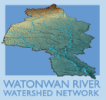The Watonwan River Watershed in south central Minnesota covers 561,620 acres (878 square miles) in Blue Earth, Brown, Cottonwood, Jackson, Martin, and Watonwan counties in south central Minnesota. The Watonwan River rises in central Cottonwood County and flows 113 miles through flat farmland in northern Watonwan and western Blue Earth counties, past the city of Madelia, until it flows into the Blue Earth River about eight miles southwest of Mankato.
Explore and Learn
Click here to launch a Story Map, an interactive map that let’s you explore maps, photos, videos, drone footage, and summary information about the watershed. You can learn:
- What a watershed is
- Water quality issues and scientific findings about the watershed health
- Resident perspectives about area rivers and lakes
- What is being done on the farm and in the city to improve watershed conditions
- Recreational opportunities across the watershed, and
- What you can do to help improve area rivers and lakes.
Videos
About the Network
A group of Watonwan River Watershed residents and conservation partners from across the watershed have been meeting and talking about water quality and quantity concerns. An advisory committee met over a series of meetings in 2017-2018 and came up with a list of potential actions to improve water quality and watershed health. The goal of the group is to network and learn together, to improve the information flow about the latest watershed science, and to find a network of residents and conservation partners interested in working together to improve watershed health for future generations.
You can improve your favorite lake or river’s water quality by becoming educated and involved. Everyone can play a role if you live in town or on the farm. Residents and local partners can work together to identify ways to minimize impacts and improve water quality and quantity. We are seeking at network of voices for our waters at the local level. If you’d like to connect and learn more, please contact us or your local conservation partners. We would like to hear from you.
